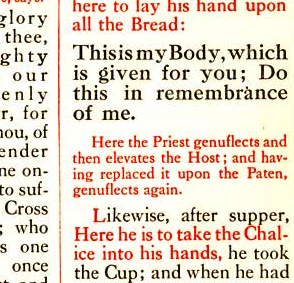![]()
This originally appeared at Revision Matters
Episcopalians have long been known as a people of the book — the Book of Common Prayer, that is. This is a wonderful reputation to have. There is something powerful in the idea that “o’er each continent and island …. the voice of prayer is never silent.” To be able to walk into any church in the world and be able to participate in the familiar rhythms of Prayer Book worship is a gift I have treasured since I left my childhood denomination for our tradition a dozen years ago.
Except, of course, it isn’t true. Episcopalians might be people of common prayer; that is, prayer said in common, but there is more in heaven and earth than can be held solely within the pages of the 1979 Book of Common Prayer, Horatio. First, there is more than one Book of Common Prayer in the Anglican tradition. Well, duh. Many Episcopalians are familiar with the Irish or New Zealand books of Common Prayer, those being in vogue these days. Many have traveled to the Motherland, England, and participated in services according to the 1662 Book of Common Prayer, or the authorized modern alternative, Common Worship.
And yet, there seems to be a strain within the Episcopal Church that views our Prayer Book as normative for modern Anglicanism.
I remember organizing a service in seminary according to a much older version of the Book of Common Prayer. We had a north-facing altar, there was no epiclesis, and the rubrics (you know, those little italicized directions that offer instruction as to the movement taking place while we say the words on the page) of that book were very clear that the presiding cleric was to take home any remaining bread to eat with his meals that week, as though he were a Levitical priest of ancient times, eating leftover portions of the sacrifice. These practices, so far from 21st-century US Episcopal ones, were disconcerting to many of my classmates. But who are we to say that our habits are the more authentically Anglican ones?
I have become increasingly aware of these tendencies in TEC since I moved to accept a call in the Anglican Church of Canada. I was completely unfamiliar with the Canadian Book of Common Prayer (1962) before arriving, and only marginally better acquainted with its more popular cousin, the Book of Alternative Services. As Canada is to the United States more generally, so too its liturgies are deceptively similar — until they’re not.
The Collect for Purity is optional in the BAS, and when it is prayed, it is done in unison, not by the priest alone. There’s a Proper Prayer over the Gifts to be said, but no Offertory Sentence. There’s a Proper Prayer After Communion appointed for each day in the Church Year, and an optional Doxology to follow. I could go on, but you get my drift.
This experience has broadened my conception of what it means to be a people of common prayer. There are so many options explicitly stated (most rubrics are along the lines of “then may be said”) that one can find wildly diverse worshipping opportunities in my city, all of which can be described as according to the BAS. Not to mention the fact that violating the rubrics isn’t a disciplinary offense here. While your bishop (or your congregation) has the right to be annoyed at you for haring off into the liturgical unknown, they can’t hold over your head the possibility that they might file Title IV-equivalent charges for your rubrical infidelity.
This might horrify some US Episcopalians, many of whom I have heard question whether we can consider ourselves to be people of common prayer if our rubrics are not held as vital components to our ordination vows. And yet just over the border, our Canadian siblings, who equally vow fidelity to the doctrine, discipline, and worship of Christ as this Church has received them, are faithfully offering authentically Anglican worship, without quite so much invested in a few words in italics.
I wonder if, as TEC considers Prayer Book revision, we might consider broadening our view of what it is that makes prayer common. Is it the familiar routine of our worship, always the same, in saecula saeculorum? Is it fidelity to those italicized directions, no matter whether they reflect that which is understanded of the people we are currently serving?
For heavens’ sake, I’ve been cautioned against changing any ‘He’’s in the Prayer Book to God, let alone ‘She,’ not because the person doing the cautioning disagreed with this characterization of the Almighty, but because I didn’t have the authority to change the words in a book written not by Cranmer himself but by a committee entirely made up of men less than 40 years ago. Because changing the words would make our prayer no longer held in common.
It is long past time for TEC to revise its Prayer Book. But in order to revise it wisely, TEC must look beyond its borders to consider what it is that makes our prayer common. Not a hegemonic uniformity of words, but a unity of tradition that honors our Cranmerian heritage and incorporates a diversity of practices organically proliferating o’er each continent and island.
Jordan Haynie Ware is a priest in the Anglican Church of Canada, and formerly served in the diocese of Fort Worth. She is the author of The Ultimate Quest: A Geek Guide’s the [Episcopal] Church and is one half of the podcast team at Two Feminists Annotate the Bible.

